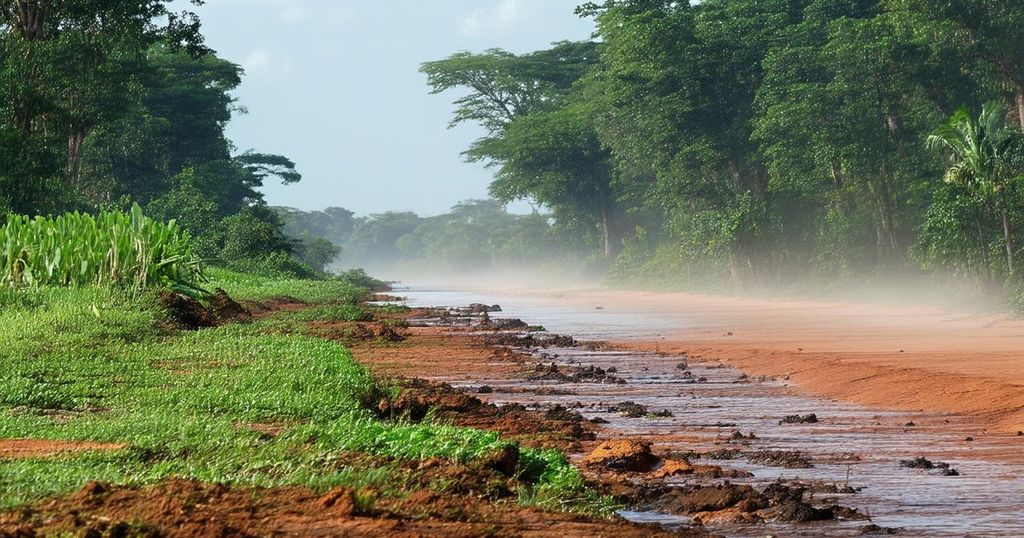Climate Change and Development Challenges in the Central African Republic
The Central African Republic faces a significant cycle of underdevelopment, political fragility, and heightened vulnerability to climate change. With one of the lowest GDP per capita figures globally and critical deficiencies in health and education, the country grapples with a poverty rate affecting 70% of its population. Ongoing political instability has led to governance challenges, while environmental factors exacerbate food insecurity. Breaking this cycle necessitates comprehensive strategies aimed at fostering resilience and sustainable development.
The Central African Republic (CAR) finds itself ensnared in a perilous cycle of underdevelopment, political fragility, and increased susceptibility to climate change, as elaborated in the CAR Climate and Development Report (CCDR). This multifaceted predicament is not merely theoretical; it is substantiated by empirical data revealing the chronic challenges that CAR endures. Economically, CAR suffers from severe underdevelopment, as reflected in its astonishingly low GDP per capita of a mere $495 in 2019. Furthermore, the nation ranks among the lowest globally on the Human Development Index (HDI), indicating critical deficiencies in health, educational access, and overall living standards. For instance, a child born in CAR is expected to reach only 29% of their productive capacity even if they receive optimal education and healthcare. The prevalence of poverty is exceedingly high, with approximately 70% of the populace existing beneath the poverty threshold. Notably, from 2018 to 2021, 90% of households faced significant shocks, primarily due to armed conflict (54%) and climate-related disruptions (27%). Politically, CAR’s fragility is exacerbated by a legacy of conflict and upheaval that has degraded governance frameworks and fractured social cohesion. Since gaining independence in 1960, the country has faced continuous violence and political disorder, severely undermining its governance capabilities. This instability permeates societal structures, often resulting in tensions that escalate into conflicts, displacing large segments of the population and disintegrating communities. Urban areas fail to develop in a resilient and inclusive manner, denying their residents the opportunities necessary for safe and thriving environments. Environmentally, more than 80% of CAR’s populace depends heavily on agriculture and forestry, sectors that are extraordinarily vulnerable to climate variability. The CCDR highlights the detrimental effects of altered rainfall patterns and a rise in extreme weather events that jeopardize water and food security as well as livelihoods. Reports underline that erratic rainfall patterns disrupt agricultural production, exacerbating food insecurity and adversely affecting the national economy. Additionally, CAR’s abundant river systems and extensive forest cover face threats from shifting climatic conditions and potential desertification, undermining crucial natural resources. These pressing challenges are intricately interconnected, creating a convoluted web that perpetuates economic, social, and environmental stagnation. The interplay between underdevelopment, political fragility, and climate vulnerability hampers CAR’s ability to undertake effective climate resilience strategies. Furthermore, governance inadequacies obstruct sound policy implementation and stymie essential international collaboration. To disrupt this harmful cycle, it is imperative for CAR to embark on a path toward resilience and sustainable growth. This necessitates a comprehensive strategy targeting the root causes of the country’s challenges through dedicated investments, institutional fortification, and innovative policy reforms. Absent a multifaceted and integrated approach that acknowledges both sectoral and spatial challenges, CAR risks further entrenchment in this detrimental cycle, with catastrophic consequences for the well-being of its populace and future development prospects.
The Central African Republic (CAR) is situated in Central Africa and is characterized by a tumultuous history of political instability, compounded by dire economic conditions and significant environmental challenges. Major aspects affecting CAR include persistent poverty, low educational attainment, and chronic health issues, contributing to a situation where the majority of its citizens lack access to basic services. Furthermore, the country’s geographical reliance on agriculture and forestry magnifies its vulnerability to the impacts of climate change, including adverse weather patterns that threaten food security and cause socio-economic difficulties. The analysis presented in the Climate and Development Report (CCDR) seeks to illuminate these interconnected issues while proposing pathways for sustainable development and resilience against climatic and socio-economic challenges.
In conclusion, the Central African Republic is trapped in a perilous cycle marked by economic underdevelopment, political instability, and vulnerability to climate change. Addressing these interconnected challenges requires a comprehensive strategy encompassing targeted investments, institutional enhancement, and innovative policy measures. Only through a concerted effort to tackle the root causes of these issues can CAR advance toward a more resilient and sustainable future, safeguarding the well-being of its citizens and improving overall developmental outcomes.
Original Source: reliefweb.int




Post Comment